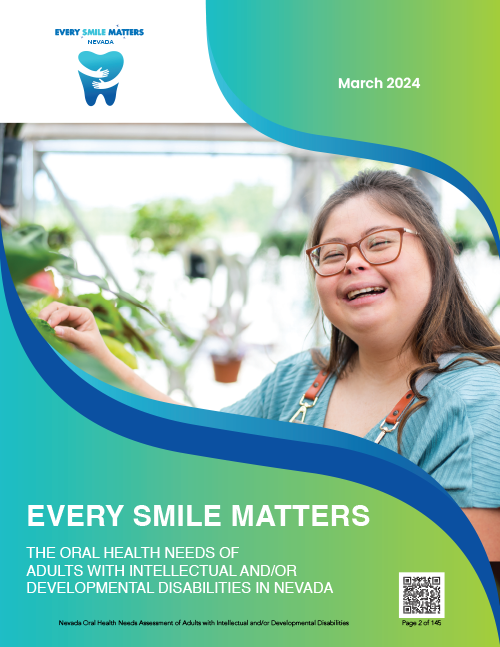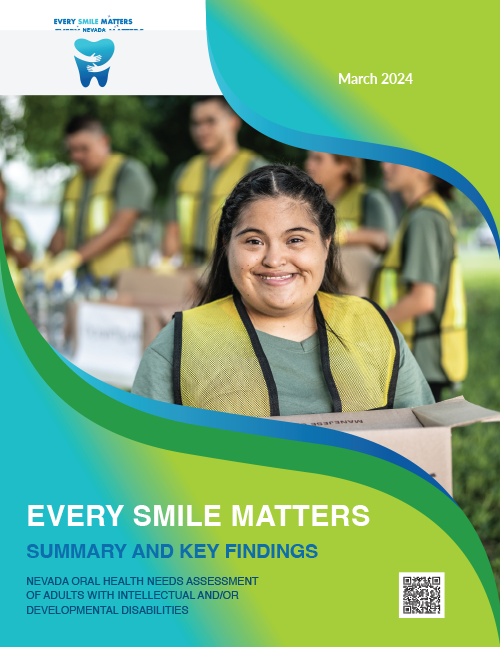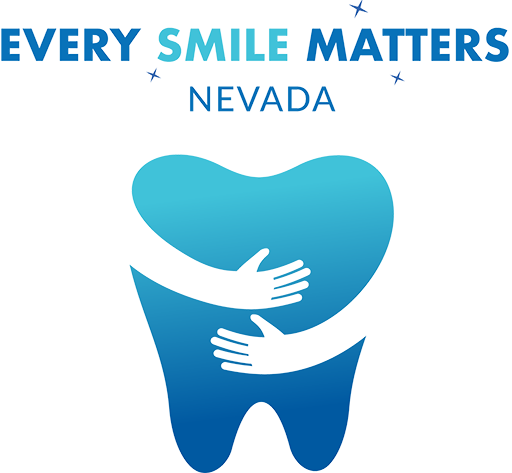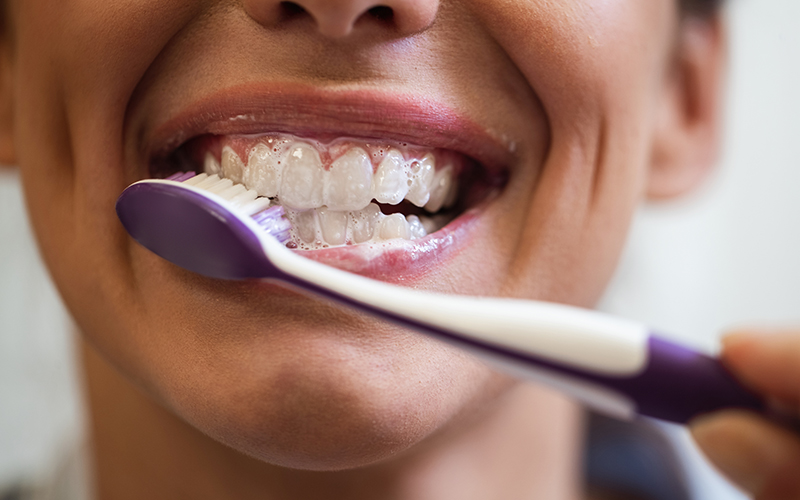Every Smile Matters
Nevada
Improving the Oral Health of Individuals with Intellectual and Developmental Disabilities Across Nevada
Purpose
Every Smile Matters is designed to increase awareness for Nevadans with intellectual and development disabilities (ID/DD) of the importance of oral healthcare as an integral part of overall health. By engaging and connecting dental and medical providers, people with disabilities and their families/caregivers, community-based organizations, community leaders, advocates, policy makers, and key stakeholders, together we can improve outcomes, increase quality of life, and improve access to culturally competent oral health care for Nevadans with ID/DD. The expanded benefits portion of this project is targeted to adults with ID/DD on the Home and Community Based ID Waiver.
Oral health IS health, and every single smile matters.
Recipients Treated in 2023
Amount Billed in 2023
need ASL translation?
Residents of Nevada and South Dakota who are deaf and hard of hearing can apply for free interpreting services through ASL Anywhere opens a new window.

Statewide ID/DD Oral Needs Assessment Completed!

Oral Health Needs Assessment IDDD (PDF) opens a new window
The data in this Nevada Oral Health Needs Assessment of Adults with Intellectual and/or Developmental Disabilities higher rates of oral disease in adults with ID/DD, the health disparities they experience, and how these disparities impact financial stability, overall health outcomes, employment, education, and quality of life. It is well documented throughout the literature that adults with ID/DD have a high burden of oral disease made worse by comorbidities and other conditions. The focus of this Needs Assessment is on working-age adults ages 18-64 with ID/DD and the significant oral health disparities they experience, and the policy, program, and practice changes to address them.

Summary and Conclusions NV Oral-IDDD Oral Health Needs Assessment (PDF) opens a new window
This is a summary and key findings report of the larger Nevada Oral Health Needs Assessment of Adults with Intellectual and/or Developmental Disabilities.
Defining the Need

According to a recent study published in the Journal of the American Dental Associationopens a new window, dental care is the number one unmet healthcare need among people with a disability.
Additionally, the study found that adults with an intellectual, acquired (an intellectual disability occurring due to accident, injury or illness after age 21), or developmental disability have significant challenges and barriers accessing culturally competent oral health care compared with adults with other disabilities or without disabilities, and poorer oral health as a result.
There are many barriers that can prevent people with intellectual and developmental disabilities (ID/DD) from receiving oral health care, including those listed below. Because of this, people ID/DD may need extra help to maintain good oral health and often require a special approach to dental care. Every single barrier and challenge can be preventable or solvable with education, training and supports.
Barriers Include:
The challenge or inability to transfer to a dental chair:
The difficulty of being transferred from a wheelchair or being safe/comfortable in a dental chair can be a challenge. Training, education, and utilization of chair inserts or other aids can help patients be more comfortable and often increase positive behaviors. Some clinics have a wheelchair lift to allow the patient to stay in their chair but manipulate the patient and chair for the dentist to provide treatment.
Manual dexterity challenges:
The difficulty of filling out forms can make accessing the dental office challenging. A well-trained front office staff that is empathetic and patient can be important in assisting with clerical tasks. In addition, the challenge with using a toothbrush makes oral hygiene difficult. Certain toothbrushes and modifications can help a patient with everyday activities like brushing.
Communication:
Patients often have difficulty communicating and sometimes are non-verbal, which can require a caregiver to communicate for and fill out forms on behalf of their loved one. A well-trained front office staff that is empathetic and patient can be important in assisting with communication needs.
Legal:
Often another person (sometimes living in a different state) may have the medical power of attorney (POA) and will have to consent to the patient’s treatment needs. A well-maintained and up-to-date patient passport with all documents that pertain to consent and contact information for the POA can help streamline the process.
Medical:
Patients with disabilities often have extensive medical challenges that require special accommodations and collaboration with their physician. Again, a well-maintained and up-to-date patient passport that includes a list of any medical conditions, medications, allergies, and dental pre-medication considerations as well as contact information for the patient’s treating physician is an invaluable resource.
Translation needs:
Some patients may need translation assistance including sign language interpreters (many teleservices are available to translate in dental offices similar to those that speak other languages besides English).
Fear:
Being afraid of going to the dentist is a challenge for many patients, including those with an ID/DD. A common strategy, especially among pediatric dentists, is the Tell/Show/Do model where communication with the patient about what, when, and how things are going to happen are clearly communicated and demonstrated. Also, a detailed dental history within the patient passport can help a dentist and staff understand prior difficulties and develop a team strategy to alleviate fear.
Behavioral challenges:
A patient’s behavior may be varied and challenging. Due to the nature of dentistry (sharp instruments, required precision, and fast-moving drills), a quick unforeseen movement could cause irreparable harm to the dental staff and patient. Communication with the dental staff about previous dental work, behaviors, and possible retained reflexes can be important. The ability to provide a variety of in-office strategies – from distraction with fidget devices to sedation services – will help a dental office provide services safely.
Access to care:
Some dental clinics are unwilling to accept patients with disabilities, many dentists do not have the training to provide excellent care to the ID/DD population, some offices do not have the appropriate equipment, and some dentists do not provide the sedation options needed to provide care. It takes extra time, training, and adaptability to treat this population, and some clinics cannot operate under the extra strain. Further, may dentists are not enrolled with Medicaid due to low reimbursement rates.
Access to sedation and other accommodations:
Individuals with disabilities may need other accommodations, including sedation or longer appointment times to receive care and meet the needs of the patients.
Some common health challenges opens a new window for people with ID/DD include:
- Mobility problems may require a person to use a wheelchair or a walker to move around. Access to the dental operatory and chair may require special arrangements and assistance with patient transfer.
- Neuromuscular problems can affect the mouth. Some people with disabilities have persistently rigid or loose chewing muscles, or have drooling, gagging, and swallowing problems that complicate oral care.
- Uncontrolled body movements can jeopardize safety and the ability to deliver oral care.
- Cardiac disorders, particularly mitral valve prolapse and heart valve damage, are common in people with developmental disabilities such as Down syndrome. Consult a cardiologist to determine the need for pre-treatment antibiotics.
- Gastroesophageal reflux sometimes affects people with central nervous system disorders such as cerebral palsy. Teeth may be sensitive or display signs of erosion.
- Seizures accompany many developmental disabilities. Patients may chip teeth or bite the tongue or cheeks during a seizure.
- Visual impairments and Hearing Loss and Deafness may also be present in people with developmental disabilities.
- Latex allergies may be more likely in people with developmental disabilities.
Further, many people with ID/DD do not have the manual dexterity or cognitive ability to carry out daily oral hygiene themselves, and their caregivers may not have the training or tools to assist them. This population also often takes medications that cause dry mouth or otherwise affect oral health.


- Tooth decay
- Periodontal (gum) disease as difficulty performing effective brushing and flossing may be an obstacle to successful treatment and outcomes
- Malocclusion, which can make chewing and speaking difficult and increase the risk of periodontal (gum) disease, dental caries, and oral trauma
- Damaging oral habits such as teeth grinding and clenching, food pouching, mouth breathing, and tongue thrusting
- Oral malformations may cause enamel defects, high lip lines with dry gums, and variations in the number, size, and shape of teeth
- Trauma and injury to the mouth from falls or accidents may occur in people with seizure disorders or cerebral palsy
Resources for Prevention and Care
Individuals & Caregiver Resources
If you have an intellectual or developmental disability, you may have some challenges taking care of your teeth. Even though…
Policy Maker Resources
Leaders and policymakers have the ability to ensure that equal access to culturally competent oral health care in Nevada…
Oral Health Provider Resources
We have a special opportunity to deliver care to a population of Nevadans that historically have not received adequate dental…
Real Voices
Caregiver Voices
Provider Voices
Leaders/Community Advocate Voices
Intellectual & Developmental Disabilities
Intellectual and developmental disabilities (ID/DD) are defined as those that are present at birth and that negatively affect the trajectory of the individual’s physical, intellectual, and/or emotional development. Intellectual disabilities can also be acquired after childhood due to accident, injury, or illness.
Intellectual Disability
A life-long condition characterized by significant limitations in both intellectual functioning and adaptive behavior that originates before the age of 18. Significant limitations in intellectual functioning refers to impairments in general mental capacity, such as learning, reasoning and problem solving. Significant adaptive behavior limitations are demonstrated in conceptual, social, and practical skills. ** It should be noted that some adults with an intellectual disability have acquired the disability after age 18 due to an accident, illness, or injury. These are called acquired intellectual disabilities.
Developmental Disability
Severe, chronic disabilities attributed to neurologically or genetically based disorders found to be closely related to an intellectual disability because the condition results in impairment of general intellectual functioning and or adaptive behavior similar to that of a person with an intellectual disability. Developmental disabilities are manifested before the age of 22 and are likely to continue indefinitely. Neurological or genetically based disorders include but are not limited to, cerebral palsy, epilepsy, autism spectrum disorder, traumatic (acquired) brain injury, fetal alcohols spectrum disorders and other chromosome/genetic disorders such as Down Syndrome or Fragile X.
Contact Us








